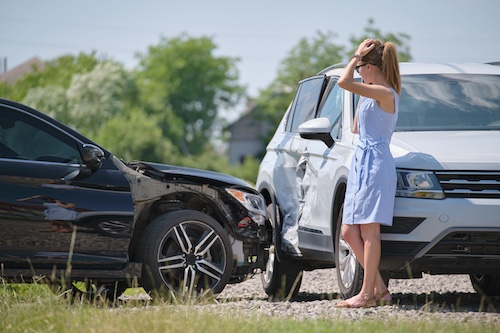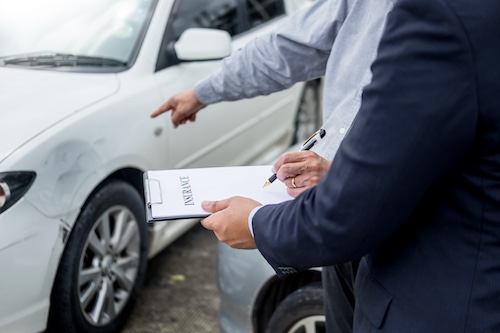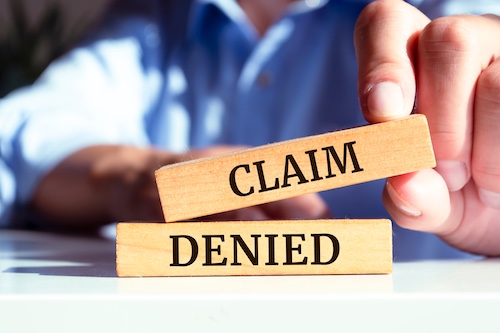Other Driver’s Insurance Denies Your Claim
At GMV Law Group, we are dedicated to protecting accident victims across Georgia. Our firm focuses on holding negligent drivers and their insurance companies accountable when they refuse to pay. We combine aggressive advocacy with personal service, making sure every client receives clear guidance and strong representation. When you work with us, you gain a team that understands Georgia law and fights to recover the full value of your claim.
Getting into a car accident is stressful, but hearing that the other driver’s insurance has denied your claim can make the situation worse. A denial often leaves you facing medical bills, car repairs, and lost income without support from the insurance company that should pay. In Georgia, fault determines who is responsible, and insurance providers look for reasons to reduce or reject claims.
Knowing why denials happen, what Georgia law requires, and when to call an Atlanta car accident attorney can help you protect your rights and secure the compensation you deserve.
Why Insurance Companies Deny Claims
Insurance companies deny claims for several reasons. Understanding these reasons helps you prepare stronger evidence and challenge an unfair decision.
Dispute Over Fault
An insurance company may deny a claim if it decides the other driver’s insurance is not responsible for the accident. Adjusters may argue you caused or contributed to the collision. In Georgia, fault matters because the driver who caused the crash must pay under their liability coverage.
Coverage Limits and Exclusions
Every insurance policy has limits. If your medical bills or vehicle repairs exceed the liability insurance available, the insurance provider may refuse to pay beyond those limits. The company may also cite exclusions in the auto insurance coverage, such as driving without permission or using someone else’s car for commercial purposes.
Questions About Injuries
Sometimes, insurers claim that your injuries are not connected to the accident. They may argue you had pre-existing conditions or that the crash caused only minor harm. This is a common reason for denying payment of medical bills under bodily injury liability coverage.
Missed Deadlines or Paperwork Issues
A claim can also be denied if the insurance company believes you failed to report the accident quickly or submit the required documents. Missing deadlines or leaving out key information gives the insurer an excuse to avoid payment.
Protecting Their Bottom Line
Ultimately, insurers review every claim with the goal of limiting what they pay. Knowing the reasons behind a denial allows you to gather stronger proof and, if needed, involve an Atlanta car accident lawyer to dispute the company’s decision.
Georgia’s Insurance Laws You Need to Know
Georgia law sets the foundation for what drivers must carry and how claims are handled. Knowing these rules helps you understand your options when the other driver’s insurance denies responsibility.
Minimum Liability Coverage
Under O.C.G.A. § 33-7-11, every driver in Georgia must carry a minimum level of liability insurance. This includes $25,000 for bodily injury liability per person, $50,000 per accident for bodily injury, and $25,000 for property damage. If the other driver’s insurance denies your claim, these limits matter because they define the minimum coverage available.
At-Fault System
Georgia follows an at-fault system, which means the driver who caused the accident is responsible for paying damages through their auto insurance coverage. If the insurance provider disputes fault, your ability to recover medical bills, repair costs, and other damages may be delayed or denied.
Uninsured and Underinsured Motorist Coverage
Drivers in Georgia can also carry uninsured motorist coverage and underinsured motorist coverage. These parts of your insurance policy protect you if the other driver’s insurance denies payment or if their liability coverage is too low to cover your injuries or vehicle repairs. This optional primary insurance can be critical in serious accidents.
Medical Payments Coverage
Many Georgia drivers add medical payments coverage to their policies. This benefit pays for immediate medical bills regardless of fault. If the other driver’s insurance refuses to pay, your own auto insurance may provide temporary relief through this coverage.
Why These Laws Matter
Understanding Georgia’s required insurance coverage and optional protections gives you more control after an accident. It also shows why reviewing your own insurance policy with an insurance agent is important before a dispute arises.
Steps to Take Immediately After a Denial
A denial from the other driver’s insurance does not mean the process is over. Taking the right steps quickly can protect your claim and improve your chances of getting payment.
Review the Denial Letter
Start by reading the denial letter in full. The insurance company must explain why it refused to pay. Look for details about coverage limits, exclusions in the insurance policy, or disputes over fault. Understanding the company’s decision is the first step in building your response.
Request Written Justification
Ask the insurance provider for a complete written explanation of the denial if one was not included. Having the reason in writing makes it easier to dispute the claim later and ensures the company cannot change its story.
Gather and Preserve Evidence
Collect all documents that support your claim. This includes the police report, medical records, bills for treatment, and repair estimates for your vehicle. If the insurance agent argues the accident or injuries were unrelated, this evidence will help prove your losses.
Notify Your Own Insurer
Contact your own insurance company after the denial. Depending on your auto insurance coverage, you may have options under collision coverage, comprehensive coverage, or medical payments coverage. These benefits can cover immediate costs while you pursue reimbursement from the other driver’s insurance.
Document Every Step
Keep a record of every phone call, email, and letter. Insurers often claim missing paperwork as a reason to deny or delay. A clear paper trail protects you in disputes and supports your case if you later work with an Atlanta car accident lawyer.
Appealing the Company’s Decision
If the other driver’s insurance denies your claim, you have the right to challenge the outcome. An appeal forces the insurance company to review the facts and reconsider its position.
Understand the Appeal Process
Begin by checking the instructions in your denial letter. Most insurance providers outline how to submit an appeal. This process usually requires written communication and supporting documents that show why the company should pay under its insurance policy.
Request the Investigative File
You can ask the insurance company to provide its investigative file. This file may include statements, photos, and internal reports that the insurer used to deny your claim. Reviewing this information can reveal errors or missing evidence that support your case.
Use Georgia’s Bad Faith Law
Georgia’s Unfair Claims Settlement Practices Act (O.C.G.A. § 33-6-34) prevents insurers from denying valid claims without cause. If the insurance provider fails to investigate properly, delays payment, or ignores evidence, you may have grounds to argue bad faith.
Submit Strong Evidence
Strengthen your appeal with medical records, repair invoices, witness statements, and police reports. These documents help counter claims about pre-existing conditions, lack of damage, or insufficient proof of fault. A detailed file makes it harder for the insurer to refuse payment.
Seek Legal Guidance
If the insurance company refuses to reconsider, an Atlanta car accident attorney can step in. An attorney can negotiate directly with the insurer, cite Georgia law, and file suit if the denial violates the terms of the auto insurance coverage. This step is often necessary to force payment when the other driver’s insurance resists.
When to Call an Atlanta Car Accident Attorney
Sometimes a denial from the other driver’s insurance cannot be resolved alone. An Atlanta car accident attorney can protect your rights and push the insurance company to pay what the law requires.
Serious Injuries and High Medical Bills
If you face extensive treatment or long-term care, the stakes are high. The insurance provider may try to avoid paying full medical bills under bodily injury liability. An attorney can calculate the true cost of your injuries and pursue the full amount.
Denial Without Clear Justification
When the insurance company refuses payment without giving a valid reason, it may be acting in bad faith. An Atlanta car accident lawyer can use Georgia law to challenge the denial and demand accountability.
Complicated Coverage Disputes
Cases involving multiple policies, primary insurance, or questions about liability coverage are difficult to handle alone. An attorney can review the insurance policy, identify gaps, and argue for payment under the correct coverage.
Pressure from the Insurance Company
Insurers sometimes delay, deny, or reduce claims in the hope that injured drivers will give up. An attorney removes that advantage by negotiating directly with the insurance provider and preparing the case for court if needed.
Protecting Your Legal Rights
An Atlanta car accident attorney ensures deadlines are met, evidence is preserved, and your case is presented with strength. Calling a lawyer early can make the difference between an unpaid denial and a fair settlement from the other driver’s insurance.
Consult With an Experienced Atlanta Car Accident Lawyer ASAP!
If the other driver’s insurance has denied your claim, you do not have to face the process alone. Our team at GMV Law Group has the experience to challenge unfair insurance decisions, hold insurers accountable, and fight for the compensation you deserve.
Contact us at 404-975-4878 for a free case review today!







